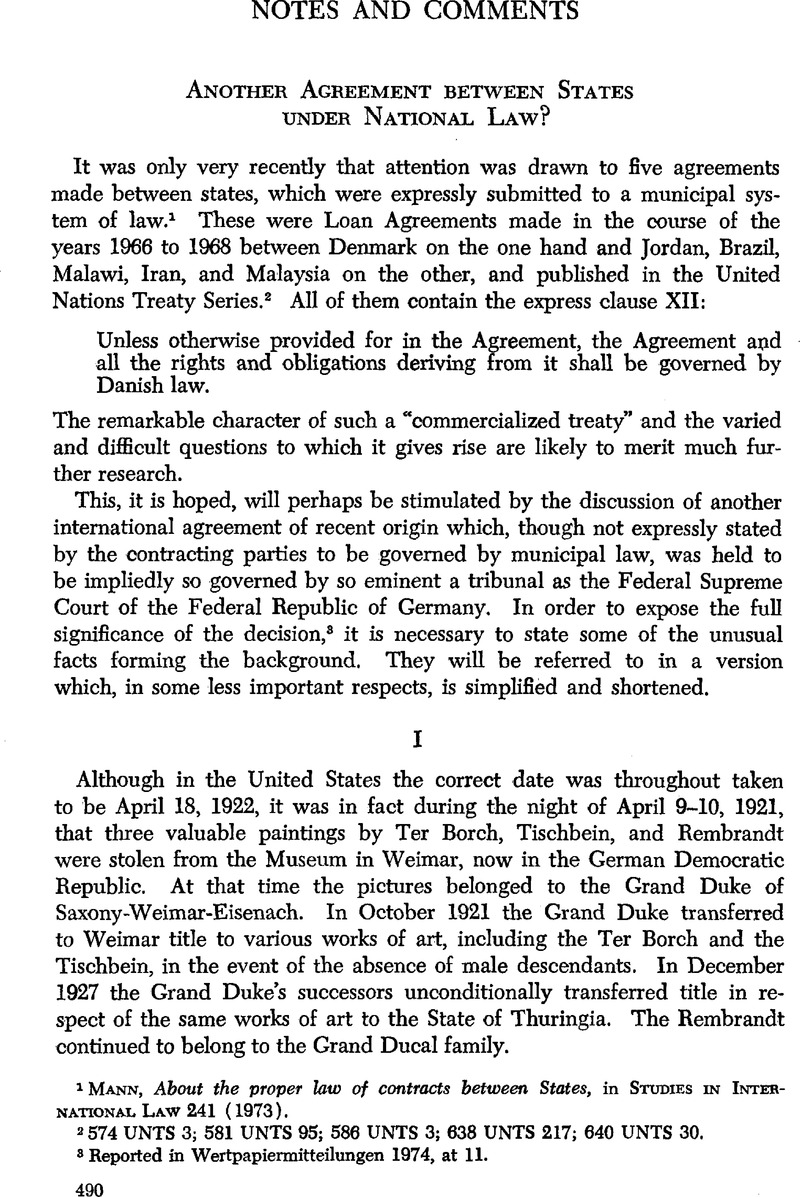No CrossRef data available.
Published online by Cambridge University Press: 28 March 2017

1 Mann, About the proper law of contracts between States, in Studies in International Law 241 (1973).
2 574 UNTS 3; 581 UNTS 95; 586 UNTS 3; 638 UNTS 217; 640 UNTS 30.
3 Reported in Wertpapiermitteilungen 1974, at 11.
4 Statement of Ely Maurer, Asst. Legal Adviser, Dept. of State, in Hearings before the Subcomm. on Commerce and Finance of the House Comm. on Interstate and Foreign Commerce, 89th Cong., 2d Sess. ser. 89–46, at 3 (1966).
5 112 Cong. Rec. 23805 (1966).
6 Testimony by Mr. Schackleton in Hearings, cited supra note 4, at 7. The statement is a reflection of the famous Declaration made by the Allied Governments in New York on September 19, 1950 and frequently reaffirmed up to the change of policy in 1969. See Mann, , Germany’s Present Legal Status Revistited, Int. & Comp. L.Q. 779 (1967)CrossRefGoogle Scholar or Studies in International Law, supra note 1, at 683 (or, in German, Juristenzeitung 608 (1967)). It is significant that in the present context the Government of the United States clearly attributed legal character to the Declaration. Because the Federal Government was the only government authorized to speak on behalf of the German people as a whole, the United States was both entitled and bound to deal with it in returning the pictures. The view adopted by the House of Lords in Carl Zeiss Stiftung v. Rayner & Keeler (1967) 1 A.C. 853, according to which the Declaration envisaged only political or diplomatic representation, remained wholly isolated.
7 P.L. 89–619, 80 Stat. 871. 50 U.S.C. App. §39(e).
8 Agreement relating to the Transfer of Three Paintings to the Federal Republic of Germany for the Weimar Museum, effected by an exchange of notes at Washington, Dec. 9/16, 1966. 17 UST 2279, TIAS No. 6169, 681 UNTS 57.
9 Reprinted in 112 Cong. Rec. 22860 (1966).
10 Testimony by Mr. Mondello of the Office of Alien Property, Dept. of Justice in Hearings, cited supra note 4, at 14, 16.
11 Insofar as the Ter Borch and the Tischbein are concerned, the decision leaves it obscure when the Grand Duke lost title and, in particular, whether he lost title as a result of the conditional transfer which seems to have taken place in October 1921 and which is mentioned in the text. In April 1921 the pictures seem to have been the unchallenged property of the Grand Duke. It is much to be regretted that by the introduction of the wholly erroneous date of April 18, 1922 a serious uncertainty was created.
12 At this point the term is not used in the somewhat restricted sense of the Vienna Convention which in Article 2 defines “treaty” as “an international agreement concluded between States in written form and governed by international law.”
13 The possibility, assumed by the German court, of an international agreement being subject to municipal law was suggested by Mann, The Law Governing State Contracts, 21 Brit. Y.B. Int. L. 11 (1944) or Studies in International Law supra note 1, at 179.
14 See, e.g., Drobnig, , American-German Private International Law 345–47 (2nd ed., 1972)Google Scholar.
15 Cohn, , Manual of German Law (2nd ed., 1968)Google Scholar section 354; Körz, Trust and Treuhand (1963), among numerous other works.
16 Mainly in that the beneficiary cannot claim against the third person who acquires trust property from the trustee with notice of the breach of trust and that proceeds of the sale of trust property are not subject to the trust.
17 See, e.g., Wilfred Jenks, C., The Prospects of International Adjudication 416 (1964)Google Scholar.
18 In England, an individual seems to be unable to claim under a treaty except possibly if the Crown expressly acted as agent or trustee of its subjects: Civilian War Claimants Association v. The King, A.C. 14 (1932), on which see Mann, Studies in International Law, supra note 1, at 356.
19 It is firmly established in Germany that in entering into a treaty a state cannot act as undisclosed principal of another party: Federal Constitutional Court, June 30, 1953, BVerfG 2,347,372 sqq.; Federal Supreme Court, Feb. 25, 1960, BGHZ 32, 76, 86.
20 Eck v. United Arab Airlines, 15 N.Y. 2d 53, 203 N.E. 2d 640 (1964) comes close to it.
21 Cf. Art. 39 of the Vienna Convention.
22 It is perhaps not without interest to refer to another decision of the Federal Supreme Court (June 12, 1963, BGHZ 39, 384), where a treaty provides for certain claims to be submitted before June 30, 1953, but is incorporated into German law only in September 1953, no claims can be made and it is not open to the courts to extend the time limit by way of interpretation.